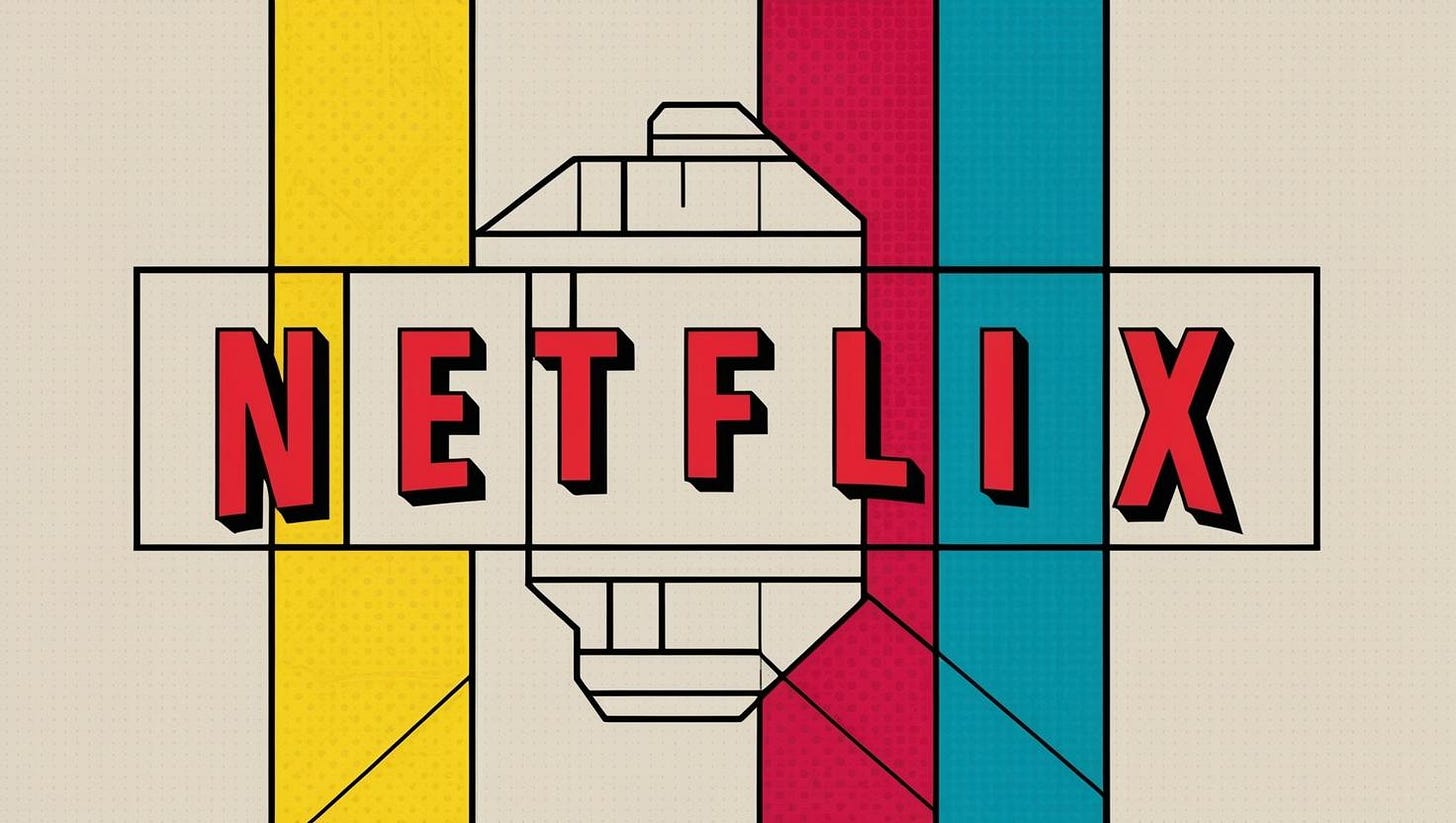Today’s email is brought to you by Empower your podcasting vision with a suite of creative solutions at your fingertips.
Welcome to There’s a Glitch
Hey, everyone, it's Saturday, May 10 , and Don't forget that tomorrow is Mother's Day, so spoil your mum on this special day for her, being a mum is not an easy job. .
If you have any thoughts or feedback, our inbox is open, contact us via email, and don't forget to sign up for this newsletter here if you haven't already. Encourage a friend to subscribe as well! - Miko Santos
🔥 Netflix Unveils Redesigned TV Experience with Enhanced Navigation and AI-Powered Search
Netflix has introduced a significant redesign of its TV interface, prioritizing intuitive navigation, responsive recommendations, and AI-powered search functionality, according to Netflix Chief Product Officer Eunice Kim and Chief Technology Officer Elizabeth Stone during their recent product announcement.
The Key Points:
Netflix is launching a streamlined TV interface design that prominently displays content information and contextual markers like "#1 in TV Shows" to improve decision-making
Essential navigation elements including Search and My List are being repositioned for enhanced visibility and accessibility
The platform is implementing more responsive real-time recommendation algorithms that adapt to viewers' immediate interests
A new iOS beta feature leverages Generative AI for natural language search queries like "I want something funny and upbeat"
An upcoming vertical discovery feed will showcase clips from Netflix content, allowing instant viewing or saving for later
Why It Matters
This interface overhaul represents Netflix's continued investment in technological innovation while maintaining user experience simplicity. For individual viewers, these improvements mean less time searching and more time enjoying content that matches their preferences.
For the tech industry, Netflix's implementation of conversational AI search capabilities signals a shift toward more natural human-computer interaction paradigms across streaming platforms. This evolution demonstrates how established tech companies can leverage their scale and technical expertise to continuously refine core products while introducing cutting-edge capabilities that enhance fundamental user journeys.
🤖 AI Milestone: Large Language Models Pass the Turing Test
🚨Texas Attorney General Secures Record $1.375B Google Privacy Settlement
Google has secured a $1.375 billion settlement with Texas Attorney General Ken Paxton, marking the largest recovery by any state against the tech giant for data privacy breaches.
The settlement is for allegedly tracking users' geolocation data, incognito searches, and biometric information, exceeding previous privacy settlements with other states, as announced in an official release from the Texas Attorney General's Office.
The Key Points:
The $1.375 billion settlement dwarfs previous state privacy settlements with Google, which haven't exceeded $93 million
Texas sued Google in 2022 for allegedly tracking users' locations, incognito searches, and collecting biometric data without proper consent
The settlement is part of Texas' aggressive tech regulation strategy, following a $1.4 billion settlement with Meta in July
This represents the highest recovery nationwide against Google for state privacy law enforcement
Why It Matters
This settlement creates a powerful precedent for consumer data protection in the tech industry. Individual users now have stronger leverage against unauthorized data collection practices, potentially changing how tech companies approach privacy policies. The substantial financial penalty signals to tech firms that violating privacy rights carries serious consequences, potentially leading to improved transparency and stronger opt-in requirements for location tracking and biometric data collection.
Texas has positioned itself as the leading state for tech privacy enforcement, with Attorney General Paxton establishing what his office calls "the largest data privacy and security initiative of any state." Earlier settlements included $700 million and $8 million agreements with Google for anticompetitive and deceptive trade practices, in addition to a record $1.4 billion settlement with Meta over facial recognition data collection.
"In Texas, Big Tech is not above the law," Paxton stated in the press release. "This $1.375 billion settlement is a major win for Texans' privacy and tells companies that they will pay for abusing our trust."
The settlement resolves allegations that Google improperly tracked users' movements, private searches conducted in incognito mode, and collected biometric data including facial geometry and voiceprints through various products and services.
For tech users concerned about their privacy, this settlement highlights the importance of regularly reviewing app permissions, particularly around location tracking and biometric data sharing. Privacy experts recommend checking Google account settings to limit data collection and utilizing privacy-focused alternatives when conducting sensitive searches.
👓 Meta Revives Facial Recognition for Next-Gen AI Glasses Amid Privacy Concerns
Meta is introducing facial recognition technology into its next generation of AI-powered glasses, codenamed "Aperol" and "Bellini," marking a significant departure from privacy commitments, according to a report from The Information.
The glasses feature always-on camera systems for continuous recording and memory of daily interactions, facilitated by a more permissive regulatory environment under the Trump administration.
The Key Points:
Meta's next-gen AI glasses will incorporate facial recognition after initially scrapping the feature from first-generation Ray-Ban Meta AI glasses
The glasses will feature an "always-on" AI capability that keeps cameras and sensors active to record and remember daily encounters
This development coincides with Meta's April privacy policy updates for AR glasses, signaling a strategic shift
The company cites a "more business-friendly" FTC under the Trump administration as enabling this technological direction
Why It Matters
This product evolution represents a pivotal shift in how personal data is collected and processed in public spaces. For individual tech users, Meta's implementation creates significant implications for both consent and data security. The always-on facial recognition capabilities fundamentally transform social interactions, as individuals may be unknowingly identified and recorded by wearers without explicit permission.
The surveillance capabilities being built into consumer products signal an industry-wide trend where AI companies increasingly prioritize data collection over privacy protections. Technical professionals should note that this represents a significant expansion of private surveillance infrastructure that could ultimately provide training data for next-generation AI systems.
The report indicates Meta's current live AI feature is limited to approximately 30 minutes due to battery constraints, but engineers are working to extend this capability to "hours" while integrating facial recognition functionality. While Meta reportedly plans to implement an opt-in system for wearers and possibly include an indicator light to signal when the "super-sensing" feature is active, these measures address only wearer consent, not the privacy of those being recorded.
This development aligns with similar industry moves by companies like Perplexity and OpenAI, which are exploring new data collection vectors. For technology professionals concerned about privacy implications, this represents an opportunity to evaluate alternative platforms and advocate for stronger industry standards around facial recognition consent models.
To properly assess personal exposure to these technologies, users should review updated privacy policies from Meta and consider how facial recognition implementations might impact their digital footprint in public spaces.
🛰️ Google Expands Gemini AI Access to Under-13 Users Despite Safety Concerns
Google's initial rollout of its Gemini AI chatbot for Australian children under 13 has raised concerns among AI experts, including Professor Toby Walsh from UNSW and UNICEF Australia's John Livingstone.
Ange Lavoipierre reported on the controversy, highlighting the potential risks to younger users and the need for government intervention.
The Key Points:
Google will make Gemini available to Australian children under 13 in coming months
The service will be automatically enabled through Google's Family Link app, with opt-out options
Experts express concerns about children's ability to discern AI hallucinations and misinformation
Calls emerge for government intervention similar to Australia's social media age restrictions
Why It Matters:
This development represents a significant shift in how AI interfaces with vulnerable populations. For individuals and families, it introduces both educational opportunities and potential risks around information literacy, digital relationships, and content safety.
With AI increasingly integrated into educational tools, parents will need to develop new oversight strategies for technologies that can misinform or form inappropriate pseudo-relationships with children.
👉 If you're looking to get up to speed with podcasting in Southeast Asia and around the globe in just five minutes, this is the perfect place for you! Just click here.
Any news tip ?
A journalist's credibility is based on their sources and advice. Contact our editor via Proton Mail encrypted, X Direct Message, LinkedIn, or email. You can securely message him on Signal by using his username, Miko Santos.
More on Mencari
Mencari—for nightly bite-sized news around Australia and the world.
Podwires Daily—for providing news about audio trends and podcasts.
There’s a Glitch—updated tech news and scam and fraud trends
Viewpoint 360 - An investigative report based on evidence , produced in collaboration with 360info.
The Expert Interview Podcast features expert interviews on current political and social issues in Australia and worldwide.
There’s a Glitch readers receive journalism free of financial and political influence.
We set our own news agenda, which is always based on facts rather than billionaire ownership or political pressure. Despite the financial challenges that our industry faces, we have decided to keep our reporting open to the public because we believe that everyone has the right to know the truth about the events that shape their world.
Thanks to the support of our readers, we can continue to provide free reporting. If you can, please choose to support The Mencari.
It only takes a minute to help us investigate fearlessly and expose lies and wrongdoing to hold power accountable. Thanks!














